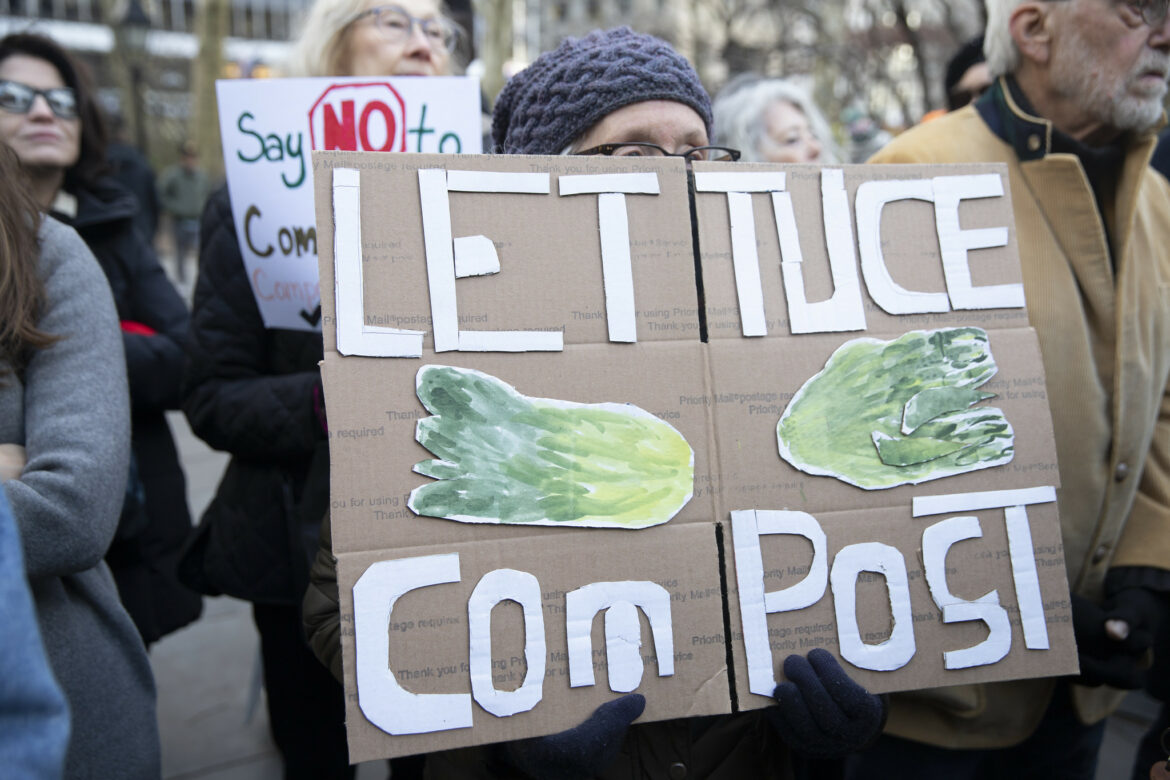“Our best hope for a better future lies in communities coming together to care for the land we inhabit. Losing city-funded community composting programs will make that much harder.”

John McCarten/NYC Council Media Unit
A rally to save the city’s compost program from budget cuts in December.Composting is a process of transformation—taking food scraps and woody, carbon-rich material and transforming them into a beautiful, dark crumbly soil amendment. Community-scale composting facilitates another process of transformation; it transforms neighborhoods, creates social infrastructure, and gives individuals agency in the face of the climate crisis.
When Mayor Eric Adams issued budget cuts eliminating funding for community composting, all seven partners of the NYC Compost Project (NYCCP) and other city-funded programs lost 100 percent of their funding. While some NYCCP organizations have received emergency funding from private donors, those donations will only keep bare-bones operations going—all educational offerings have halted. The other half of the NYCCP partners have not received any stop-gap funding.
Mayor Adams has proposed that curbside composting and smart bins are sufficient methods for diverting organic waste. However, most of the organics collected in these bins are—in a blatant act of greenwashing—not actually turned into compost. Instead, they are mixed with sewage and processed via anaerobic digestion into methane and bioslurry.
These municipal services also lack the corresponding education effort essential for community buy-in. The NYCCP taught over 600,000 New Yorkers yearly that properly managed compost piles do not smell, do not attract rodents, and create a hugely beneficial soil amendment. These programs also hosted volunteer days where participants could get their hands dirty collecting food scraps, building piles, and sifting finished compost.
When folks get involved in the magical transformation that occurs during organic waste decomposition, it changes minds. The hundreds of community compost sites that depend on city-funding for their operations do just that. They provide free spaces for residents to play around in the world of compost, to ask questions, and to learn.
The social infrastructure of community composting sites, whether a community garden, a food scrap drop-off site, school, or church, cannot be replaced by curbside composting or orange smart bins. The conversations and stories shared between neighbors build long-term connections and a deeply motivated interest in participating in composting.
Until Dec. 31, 2023, when the budget cuts went into effect, I worked for the NYC Compost Project hosted by Queens Botanical Garden. Queens is the most diverse county in the United States, and the garden, located in Flushing, has patrons who have immigrated from all over the world. Many volunteers and neighbors shared with us that they use our compost to grow the vegetables from their home countries that they cannot find in American supermarkets. Having access to free, hyperlocally produced “good dirt” helps them have a bountiful harvest year after year—a beautiful example of food sovereignty in neighborhoods that disproportionately experience environmental injustice.
At our compost events, we often had volunteers who said, “This is how we deal with food scraps where I’m from! Although, we didn’t call it ‘compost.’ It’s just what we do.” In many countries without government-provided waste management programs and prior to the widespread adoption of single-use packaging, much of household waste was compostable. It was easy to return food scraps to the Earth. The NYCCP offered a space for people to connect back to practices that modern urban life has made nearly untenable.
Composting is an ancient process. What we as composters do is not novel—it’s what humans have been doing forever. Yet in today’s New York City, where access to green space is so limited (and unequally distributed), participating in a process that repairs the city’s depleted soils, and allows residents to have a positive impact on their environment, feels radical.
The reciprocity of compost connects us with something deeper, nurturing the soil food web beneath our feet as well as the communities above. While composting exists at all scales, when it happens at the community scale, it grows and deepens roots within those communities, tying individuals together through shared goals and action.
New York City was once a leader in showing cities across America how a robust community composting network can bolster curbside composting efforts and make our cities more resilient. The elimination of community composting by this administration is a devastating loss. During his campaign, Mayor Adams vowed to expand composting to all neighborhoods. To make good on his promise and introduce a socially-inclusive and environmentally-effective compost program, he must restore funding to community composting.
Our best hope for a better future lies in communities coming together to care for the land we inhabit. Losing city-funded community composting programs will make that much harder.
Greta Wong is Brooklyn-based community composter who has composted with Nurture BK Compost, Red Hook Compost, and the NYC Compost Project hosted by Queens Botanical Garden.









One thought on “Opinion: Community Composting Produces More Than Just Good Dirt”
Actually agriculture still plays an important part even though its proportion is not so high. The information is really quite unfortunate when it comes to cutting some subsidy sources.